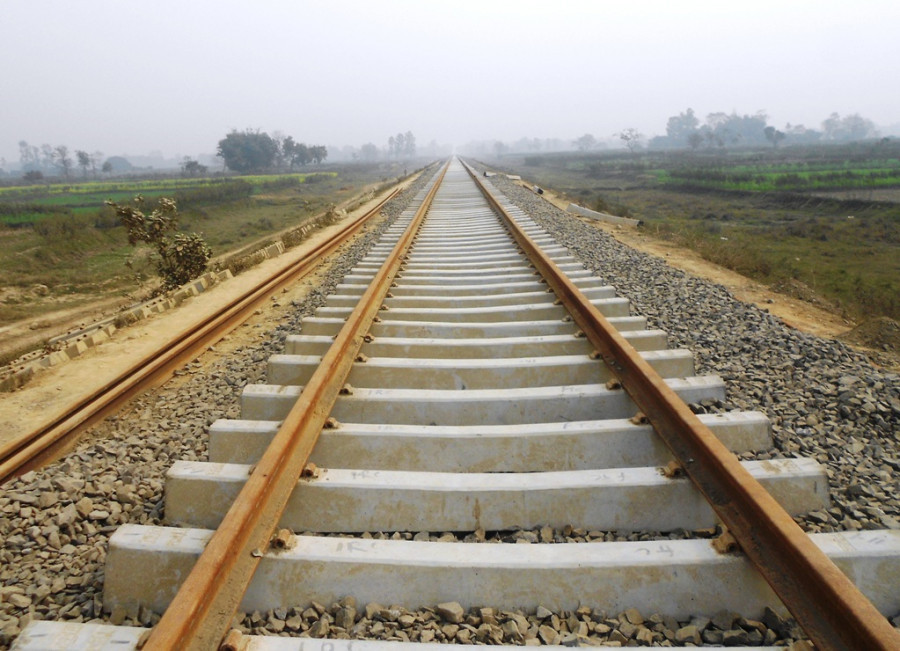Money
Proposed Kathmandu-Raxaul rail project moves a step ahead
The broad-gauge line will cost $3.15 billion and link the capital with the Indian railway network.
Prithvi Man Shrestha
Nepal and India have moved ahead to prepare a detailed project report for a broad-gauge rail line between Kathmandu and Raxaul that will link the capital with the Indian railway network and provide access to all Indian cities
A cabinet meeting on March 9 gave an in-principle approval to the Ministry of Physical Infrastructure and Transport to sign a memorandum of understanding with India to create a plan for the proposed $3.15 billion project.
The train link to the Indian border town of Raxaul, which will be 136 km to 198 km long, is seen as New Delhi’s attempt to counter Chinese influence in Nepal.
The cabinet meeting also decided to delegate authority to the director general of Nepal’s Department of Railway to sign the memorandum with its Indian counterpart, the head of India’s state-owned Konkan Railways Corporation.
Konkan Railways Corporation has already prepared a pre-feasibility study of the proposed broad-gauge railway project. Indian broad-gauge tracks have a width of 1,676 mm.
“Once the Indian government approves the draft of the memorandum of understanding, the two railway departments will sign a formal agreement to seal the deal,” Keshav Kumar Sharma, chief of the development assistance coordination and quality department at the Ministry of Physical Infrastructure and Transport, told the Post.
“The detailed project report is expected to take around one and a half years to complete.” According to him, the Indian government will bear the cost of preparing it.
After China moved to help Nepal build a Rasuwagadhi-Kathmandu railway in a bid to enhance cross-border connectivity, India responded with a proposal for the Kathmandu-Raxaul railway project, analysts said.
“India has shown interest in developing this project and Nepal also needs the link to improve our transport infrastructure,” said Deepak Kumar Bhattarai, spokesperson for the ministry. “Once this railway is constructed, goods can be transported directly to Kathmandu from India and third countries.”
Currently, shipments originating overseas are brought to the inland container depot in Birgunj by rail and transferred to Kathmandu and other locations by road.
According to the Department of Railway, the Chinese side has also been working on a detailed feasibility study for the proposed Rasuwagadhi-Kathmandu railway remotely due to the coronavirus pandemic.
After the Indian blockade in 2015-16, Prime Minister KP Sharma Oli had made an attempt to improve connectivity with China.
On a visit to China in March 2016 during Oli's first stint as prime minister, Nepal had requested the northern neighbour to provide financial and technical support to prepare a feasibility study and detailed project report for the Rasuwagadhi-Kathmandu and Kathmandu-Pokhara-Lumbini railway projects.
When Chinese President Xi Jinping visited Nepal in October 2019, China had agreed to prepare a detailed project report for the Rasuwagadhi railway.
With China prioritising connectivity with Nepal under its Belt and Road Initiative, India also initiated a number of connectivity projects like railways, waterways and roads and proposed to build the Kathmandu-Raxaul railway.
During Oli’s state visit to India in April 2018, the two neighbours had agreed to construct a new electrified rail line with Indian financial support connecting Raxaul and Kathmandu.
As per the joint statement issued at that time, the objective of constructing the railway is to expand connectivity to enhance people-to-people linkages and promote economic growth and development.
In August 2018, the two sides exchanged a memorandum of understanding to carry out a preliminary engineering-cum-traffic survey of the broad-gauge line. India had designated Konkan Railway Corporation to undertake the study. The railway company has completed a preliminary survey.
Konkan has signed a contract agreement with Nepal's Department of Railway to supply two 1600 HP DEMU (diesel electric multiple unit) train sets. They will run between Kurtha, Nepal and Jayanagar, India.
As per the survey report, construction of the proposed railway will need an investment of $2.66 to $3.15 billion, in addition to land acquisition, taxes on imports of various technical and other materials.
The Indian side has proposed to build four lines to connect Raxaul with Kathmandu. The construction is expected to take five years after clearance of the land from the Nepal side.
According to a report prepared by Konkan Railway Corporation, four different alternative lanes have been proposed to be built. Their lengths range from 136 km to 198 km.
After finishing the detailed project report, the Indian company will provide recommendations on which route will be most feasible and suitable for investment.




 20.12°C Kathmandu
20.12°C Kathmandu














